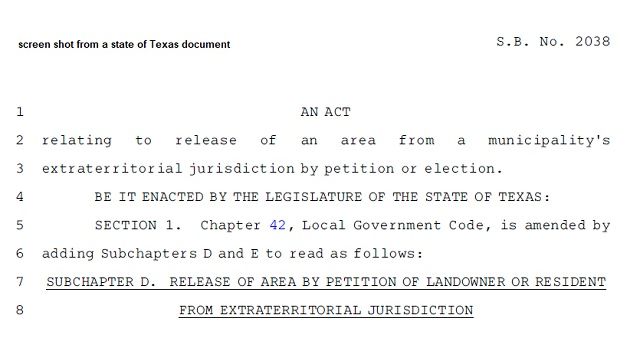
The state senator who wants to do away with College Station’s ordinance limiting the number of unrelated occupants living together, took time during a committee hearing on that subject to accuse city officials of breaking a law that was passed during the last legislative session.
Paul Bettencourt of Houston was referring to Senate Bill 2038, enacted during the 2023 session, which allows property owners to be released from the extraterritorial jurisdiction, or ETJ, of some cities that includes College Station.
Click HERE to read and download Senate Bill 2038 from the 2023 Texas legislative session.
During a March 17th hearing, Bettencourt said “When a bill is passed, I expect the cities to follow the law unless they to go to the court and actually get a temporary restraining order or go to the Supreme Court or whatever. But that did not occur with Senate Bill 2038.” “College Station is one of just maybe a handful that have ever passed a resolution that said we’re not going to follow (the) law because we believe it’s unconstitutional.”
A statement from the city of College Station to WTAW News says in part they and 19 other cities are part of a lawsuit challenging the constitutional implications of SB 2038. It is the city’s position that only the city council can approve a property owner’s request to be released from the ETJ.
Since SB 2038 has been enacted, the council has denied property owners requests to be released from College Station’s ETJ multiple times.
Click below to hear comments from Paul Bettencourt during a Texas Senate committee hearing on March 17, 2025:
Audio Player
City of College Station statement to WTAW News about the city’s position on Senate Bill 2038 that was passed during the 2023 session of the Texas legislature:
The City of College Station is concerned about the negative impacts of SB 2038 on current and future taxpayers, the quality of life in our area, and the provision of infrastructure and core city services. College Station is part of a lawsuit with 20 other Texas cities challenging the constitutional implications of SB 2038. Constitutionality is the issue at hand, and if the legislature resolves the constitutional conflict, we will follow the law. We are working with our local legislators to find a solution.
According to Texas Local Government Code Section 42.023, the City’s ETJ may only be reduced if the City Council has exercised its legislative authority consenting to reduce the City’s ETJ by ordinance or resolution and pursuant to Texas Constitution, Article II, Section 1, landowners may not be delegated legislative authority to remove their property from the City’s ETJ without the City Council’s consent by ordinance or resolution.
Texas Local Government Code Chapter 42 Subchapter D. (SB 2038) is an unconstitutional delegation of the City’s legislative authority and conflicts with the City’s grant of legislative discretion under Local Government Code Section 42.023. It is in the City’s best interest to deny any petition, the removal of any property from the City’s ETJ, a reduction in the size of the City’s ETJ, and any action under Texas Local Government Code Chapter 42 Subchapter D. (SB 2038).
